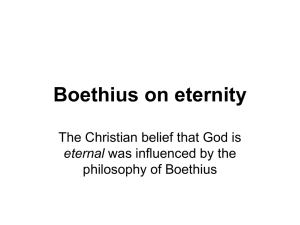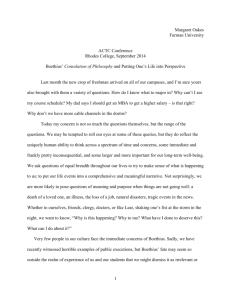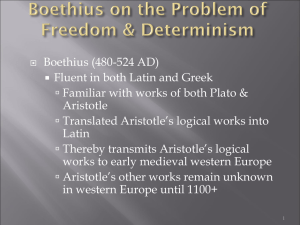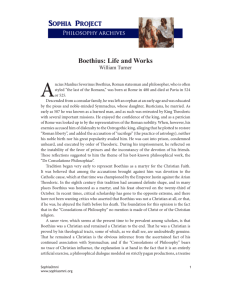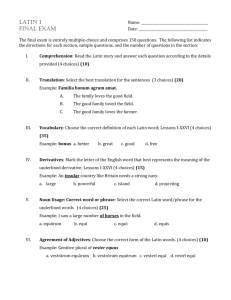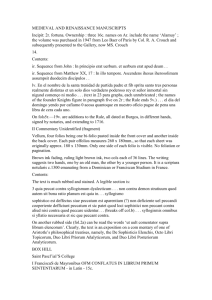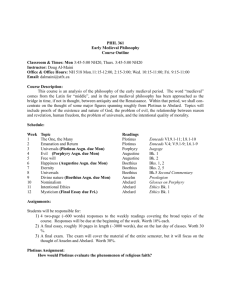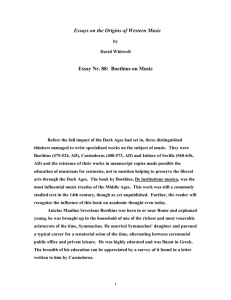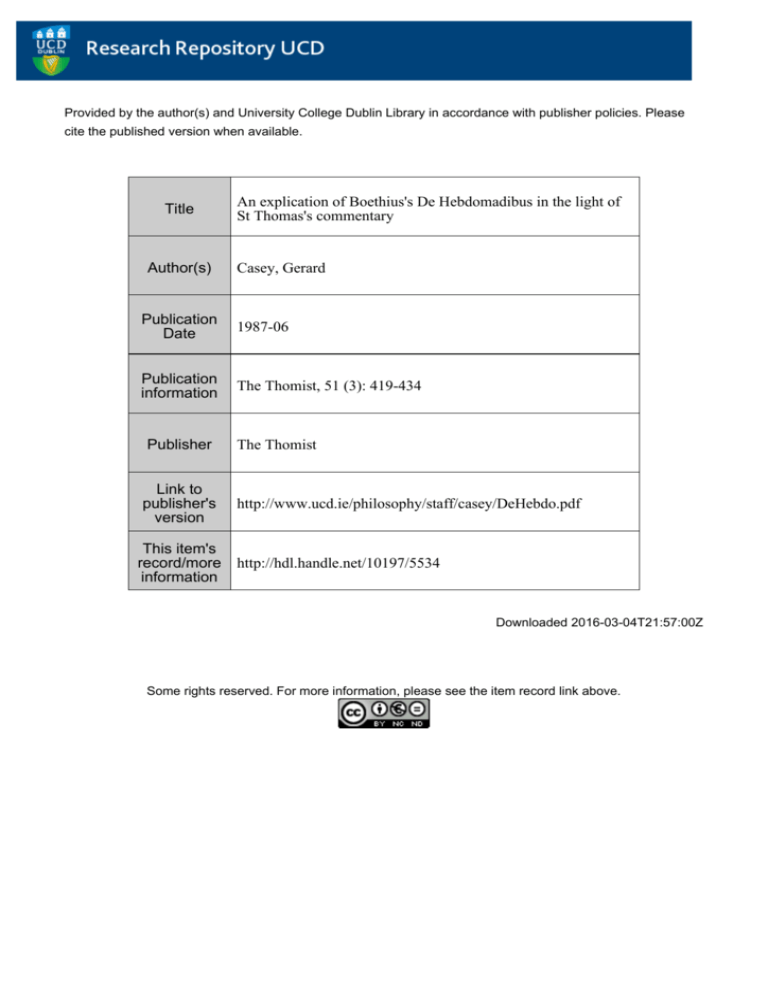
Provided by the author(s) and University College Dublin Library in accordance with publisher policies. Please
cite the published version when available.
Title
Author(s)
An explication of Boethius's De Hebdomadibus in the light of
St Thomas's commentary
Casey, Gerard
Publication
Date
1987-06
Publication
information
The Thomist, 51 (3): 419-434
Publisher
The Thomist
Link to
publisher's
version
http://www.ucd.ie/philosophy/staff/casey/DeHebdo.pdf
This item's
record/more
information
http://hdl.handle.net/10197/5534
Downloaded 2016-03-04T21:57:00Z
Some rights reserved. For more information, please see the item record link above.
An Explication of the De Hebdomadibus of Boethius
in the Light of St Thomas’s Commentary
Gerard Casey
School of Philosophy
University College Dublin
gerard.casey@ucd.ie
www.ucd.ie/philosophy/staff/casey_gerard.htm
Introduction
The writings of Ancius Manlius Severinus Boethius exercised a powerful influence on the
nature and development of mediaeval philosophy. The extent of his influence was such
that I think it fair to say that anyone seeking more than a superficial grasp of mediaeval
philosophy must acquire some first-hand knowledge of his work. The trouble is,
however, that while The Consolation of Philosophy is well-known and much commented
upon, Boethius’s other works are relatively neglected.1 Included in this latter group are
the five theological tractates, one of which has this imposing title: Quomodo Substantiae In
Eo Quod Sint Bonae Sint Cum Non Sint Substantialia Bona. This tractate also has the more
manageable title De Hebdomadibus and it is as such that I shall refer to it throughout this
article.2 I have chosen to give an explication of the De Hebdomadibus for three reasons.
First the problem with which it deals (the nature of the relation between goodness and
substance) is intrinsically interesting and Boethius’s solution to the problem is a model of
philosophical analysis. Second, in addition to the fact that the philosophical status of the
nine axioms listed in the tractate is a matter of some scholarly controversy, the answer to
the obvious question of how these axioms function in the tractate as a whole is not at all
clear. And third, this tractate is philosophically significant to those philosophers who take
St. Thomas as their inspiration since it appears that St. Thomas’s existence/essence
distinction is adumbrated here. I shall begin my explication by giving a brief overview of
the main lines of the tractate. Then I shall lay out the arguments contained in the
statement and resolution of the dilemma which Boethius constructs, indicating (by
means of Roman numerals in parentheses) where I think particular axioms are meant to
apply. Finally, I shall display the axioms as perspicuously as possible and comment on
them.
I am obliged to Professor Ralph Mclnerny for awakening my interest in Boethius and for his suggestion
that the De Hebdomadibus would repay careful study.
2 All references are to the H. F. Stewart and E. K. Rand edition of The Theological Tractates and The
Consolation of Philosophy, in the Loeb Classical Library (Cambridge, Massachusetts: Harvard University Press,
1973).
1
Overview
The groundplan of the De Hebdomadibus is as follows. It begins with a brief introduction
which contains the nine axioms. Then the problem to be considered is outlined in the
form of the following dilemma. Things which are are good. This is the basic assumption
which will generate the dilemma. Things which are good are so either by virtue of their
substance or by participation. If they are good by virtue of their substance then, since
God is the only substantial good, we arrive at an impious conclusion: we identify
creatures with their Creator. If they are good by participation then we generate a contradiction: things do and do not tend toward the good. Therefore, the conclusion must be
that things which are are not good, which manifestly contradicts the basic assumption.
Boethius’s solution to the dilemma makes use of a thought-experiment. Abstracting from
the first good he distinguishes locutions such as ‘to be’ from locutions such as ‘to be
good.’ On the basis of this distinction he is led to conclude that goodness is either a
property of things or a principle of things. Re-introducing the notion of the first good, he
notes that it is good by virtue of its very being. Secondary goods are also good by virtue
of their being but only because that being derives from the will of the first good.
Boethius cautions us against likening the being of particular things to the being of the
first good and concludes the tractate by considering and refuting two objections to his
solution.
The theme of the tractate is the problem of how substances can be good in virtue of
their being without, at the same time, being substantial goods. Boethius is moved to deal
with this particular problem by the appeal of a correspondent who urges him to elaborate
on his hints towards a solution of this obscure question. Boethius warns his friends not
to object to the obscurities resulting from brevity, remarking gnostically that such
obscurity will be penetrated only by those worthy of penetrating it. To ensure the
requisite obfuscation Boethius supplies us with a do-it-yourself argument kit in the form
of nine axioms. “The intelligent interpreter,” Boethius tells us “will supply the arguments
appropriate to each point.”3 At the outset then it seems clear that it will be one of the
reader’s tasks to discern the use being made of the axioms in the subsequent discussion.
3
Boethius, De Hebdomadibus, 53-55.
2
The Problem
I
1. Everything that is tends to the good
2. Everything tends to its like
3. Things which tend to the good are themselves good
4. Therefore, things which are are good
Step 1 in this argument derives from the common opinion of the learned. Step 2 has a
similar ancestry. (Axiom IX) Step 8 is a particular application of Step 2, and Step 4, the
conclusion, derives from Steps 1 and 3 together. Now that he has established the
goodness of things which exist, Boethius goes on to consider how this is so. Things
which are good are so either by participation or by virtue of their substance. These
alternatives Boethius seems to consider to be both mutually exclusive and universally
exhaustive. He proceeds to treat of each in turn.
Things which are good are so by participation
II
1. All things are good by participation
2. If all things are good by participation they are in no way good in themselves
3. All things are in no way good in themselves
4. All things do not tend to the good
5. All things do, and do not, tend to the good
6. Therefore, all things are not good by participation
Step 1 is the overall assumption of argument II. Step 2 is, presumably, a self-evident
truth.4 Step 3 derives from Steps 1 and 2 by modus ponens. Step 4 is derived by modus tollens
from Steps 3 and 1/3 (suitably recast in hypothetical form). Step 5 is merely the
conjunction of Step 4 and Step I/I, and the conclusion. Step 6, is derived from Steps 1
through 5 by reductio ad absurdum. With the elimination of the possibility of goodness by
participation it seems as if all things must be good by virtue of their substance.
There is a difference between merely being something in a qualified way and being something in an
essential way or in one’s very substance. In other words, there is a distinction between the substance of a
thing and the qualities which it participates. This implies, for Boethius, that if a thing is good by
participation, then goodness does not penetrate its inmost structure. The substantial reality of a thing—its
essence and existence—differs from its accidental qualities. See Charles Fay, “Boethius’ Theory of
Goodness and Being,” in James Collins, ed., Readings in Ancient and Medieval Philosophy, (Westminster, Md:
Newman Press, 1960), p. 171.
4
3
Things which are good are so by virtue of their substance
III
1. All things are good by virtue of their substance
2. If all things are good by virtue of their substance then the particular being of all things is good
3. The particular being of all things is good
4. If the particular being of all things is good then, if all things are good by virtue of their
substance, they are like the first good
5. If all things are good by virtue of their substance they are like the first good
6. All things are like the first good
7. If anything is like the first good it is the first good
8. All things are the first good
9. Therefore, all things are not good by virtue of their substance
Step 1 is the overall assumption of this argument. Step 2 is a self-evident assumption.
Step 3 derives from Steps 1 and 2 by modus ponens. Step 4 is another self-evident
assumption. Step 5 derives from Steps 3 and 4 by modus ponens. Step 6 derives from Steps
1 and 5 by modus ponens. Step 7 is yet another self-evident assumption. Step 8 derives
from Steps 6 and 7 by modus ponens and is, as Boethius puts it, “an impious assertion.”
Step 9, the conclusion, derives from Steps 1 through 8 by reductio ad absurdum.
Our basic assumption was that all things that are are good. But, as we have just seen,
they cannot be so either by participation or by virtue of their substance. And since these
seem to be the only possible alternatives we are faced with a dilemma. How are we to
overcome it?
The Solution
Mentally separating that which is not actually separable, we remove from our minds the
presence of the first good. Now, supposing that all things that exist are good, we ask
ourselves how this could be so if they did not derive from the first good. According to
Boethius we notice immediately that it is one thing for existent things to be good and
quite another thing for them to be. (Axiom V) To show us that this is indeed the case, he
considers a substance which is white, round, heavy and good. If the substance were not
different from its roundness, heaviness, whiteness and goodness, then the identification
of the substance with its attributes would lead us to identify the attributes with one
another and this, as Boethius says, is “contrary to nature.”5 What about the suggestion
5
Boethius, De Hebdomadibus, 105-106.
4
that good things might be nothing else but good, i.e. possessing only the quality of
goodness? If this were the case then, according to Boethius, we might more properly
consider them (or rather it) to be the principle of things rather than things (or a thing).
(Axiom IV) There is only one thing that is simply good and we have prescinded from
that. We can conclude from this that while things separated from the first good may be
good, their very being will not be good. Now comes the crucial passage:
But since they are not simple, they could not even exist at all unless that which is the one
sole good had willed them to exist. They are called good simply because their existence has
derived from the will of the good. For the first good, since it exists, is good in virtue of its
existence; but the secondary good, since it has derived from that whose existence is itself
good, is itself also good.6 (Axioms IV, VH& VIII)
So, the existence of good things depends on the will of the first good. In the case of the
first good, its being and goodness are identical. Just as the being of particular things is
derived from the will of the first good, so too is the goodness attached to that being. We
might erroneously conclude from this fact that particular things are like the first good
because they too are good in virtue of their substance. There is, however, a difference.
The goodness of the being of particular things is not good under all circumstances but is
so simply because of its derivation from the will of the first good. The being of the first
good is good under all circumstances since it is simply good. So, the particular .being of
things is good but it is not like the being of the first good since the one derives from the
other. (Axioms IV & VI)
Therefore, the first good being removed from these things by a mental process, these
things, though they might be good, yet could not be good in virtue of their existence, and
since they could not actually have existed unless that which is truly good had produced
them, therefore their existence is good and yet that which has derived from the substantial
good is not like its source.7
If things did not derive their being from the will of the first good it is still possible that
they could be good (perhaps, e.g. by participation) but their very being could, not be
good. Since particular beings cannot be separated from the first good except by a mental
process we may conclude that: 1. all things depend for their being on the will of the first
good; 2. the being of all things is good; and 3. although the being of all things is derived
6
7
Boethius, De Hebdomadibus, 117-125.
Boethius, De Hebdomadibus, 140-146.
5
from the will of the first good all things are not thereby like it since there is nothing like
it save itself.
Boethius wants to salvage the transcendental character of goodness without allowing it
to usurp the unique position of the first good. The derivation of the being of all things
from the will of the first good establishes the goodness of particular things and, at the
same time, establishes an essential difference between the being of particular things and
the being of the first good. Boethius concludes the tractate by considering and refuting
some objections.
Objection #1
If things which are good are so by virtue of their being, why are they not, say, white by
virtue of their being?
Response
Boethius points to the difference between accidental and substantial predication. To be is
one thing, to be white is quite another. (Axiom V) That from which things derive their
being is good by its very nature but it is not white. It accords with the will of the first
good that things be good by virtue of their being but not white by virtue of their being. If
something is white then it is so because it was willed to be so by someone who is not
himself essentially white.
Objection #2
Why then is not everything just? (And here, unlike the response to the previous
objection, we surely do not want to claim that God is not just!)
Response
In order to reply to his objection, Boethius distinguishes between essence and action.
Goodness is a characteristic of what someone is: justice is a characteristic of what
someone does. While being and action are one and the same thing in God they cannot be
equated in his creatures. We are not simply beings. Our being is not identical with our
actions so we are good by virtue of our being but we are not just by virtue of our being.
(Axioms IV, VII & VIII)
6
The Axioms
How are we to understand the axioms that Boethius presents to us? Are they merely a set
of random principles which he kept by him on his desk for use in the writing of
theological tractates? Or are they something more than that? Is there, for example, some
order or systematic connection between them such as to render them especially suitable
for the task in hand? If we rely naively on Boethius’s statement that he is going to
proceed in a mathematical manner we might be betrayed by our twentieth-century
sophistication into treating the axioms as if they were constituents of a modem axiomatic
system. As such we would expect them to be logically independent of one another and
more or less equally fundamental to the system. On inspection, however, the axioms turn
out to be concerned with a very few topics, namely, being, that which is, simplicity and
complexity. Axioms II-VIII appear to contain three central theses plus some
commentary on them, while the less centrally important axioms I and IX have ancillary
functions.
Axiom I
A common conception of the mind is defined as “a. statement which anyone accepts as
soon as he hears it.”8 Two types of these are distinguished: one which is obvious to all
men; and the other which is obvious only to the learned.
Axioms II-VIII
Basic Thesis 1
Esse and id quod est are different (II)
Comment A (II)
Esse is not yet, whereas id quod est is as soon as it receives the form which gives it being.
Comment B (III)
Esse does not participate in anything in any way, whereas id quod est can participate in
something.
Comment C (IV)
8
Boethius, De Hebdomadibus, 18-19.
7
Esse cannot possess anything outside itself, whereas id quod est can.
Basic Thesis 2
Merely to be something and to be something in virtue of existence are different (V)
Comment A (V)
To be something signifies accident, whereas to be something in virtue of existence signifies
substance.
Comment B (VI)
To be something requires accidentals participation, whereas to be something in virtue of existence
requires substantial participation.
Comment C (VI)
Accidental participation presupposes substantial participation.
Basic Thesis 3
Simple things and composite things are different9
Comment A (VII & VIII)
In simple things esse and id quod est are unified, whereas in composite things esse is one
thing and id quod est another.
Axiom IX
The principle contained in this axiom simply states the identity of natures of any two
things one of which seeks the other.
Comments on the Axioms
Axiom I
This first axiom is obviously procedural. It indicates that the remaining eight axioms are
to be understood as common conceptions of the mind of the kind intelligible only to the
learned. The presentation of such recondite theses is in keeping with the remarks
Boethius makes in the introduction to the tractate to the effect that such obscure brevity
This thesis is not explicitly stated as such in the text. However, given the syntactical format of the two
previous basic theses I do not think it too far-fetched to suppose that this is what Boethius had in mind.
9
8
has the immeasurable advantage of communicating one’s meaning only to those worthy
of receiving it.
Axioms II-VIII
Basic Thesis 1.
Esse and id quod est are different
As James Collins remarks “Among the outstanding philosophical difficulties presented
by the Opuscula Sacra is the determination of the exact meaning for Boethius of the
binary of esse and id quod est.”10 For P. Duhem, quod est signifies the really existing concrete
thing whereas esse signifies the specific nature or form common to all individuals in the
same species. Roland-Gosselin, on the other hand, gives an essentially essentialistic
account of the distinction. For him quod est signifies total essence whereas esse is a
constitutive part of that essence. According to H. Brosch, quod est signifies the concrete
essence while quo est (or esse) signifies the abstract or formal essence. Brosch also alerts us
to the fact that Latin philosophical terminology of the period was neither firmly fixed nor
unequivocal. He is not the only person to sound such a warning note. J. de Vries points
out that if Boethius was not aware of the distinction between essence and existence then
he could hardly have intended esse to signify either meaning of the term to the exclusion
of the other. In agreement with de Vries, V. Schurr claims that for Boethius esse
sometimes means essence, sometimes existence, with the essential connotation taking
precedence on most occasions of use. He points to the later sections of the De
Hebdomadibus as one place where the existential use is almost surely to be located.11 (It will
be remembered that this is the section of the tractate in which Boethius remarks on the
production of good things from the will of the first good.) To C. Fay, esse sometimes
signifies form, sometimes essence, and sometimes actual existence. Fay agrees with
Schurr in claiming that towards the end of the De Hebdomadibus esse takes on an existential
connotation.12 In view of all this it is difficult not to agree with F. Sassen’s suggestion
that we adopt the neutral term ‘being’ as the translation for esse so as to avoid attributing
James Collins, “Progress and Problem in the Reassessment of Boethius,” The Modem Schoolman Vol.
XXIII, no. 1, (1945), 1-23. In this section I am following very closely Collins’ historical survey of the
various interpretations which have been given to this crucial distinction. Precise references to the authors
mentioned may be found in his article. See also Sr. H. V. Clare, “Whether Everything That is. Is Good:
Marginal Notes on St. Thomas’s Exposition of Boethius’s De Hebdomadibus,” Laval Theologique et
Philosophique Vol. Ill, no. 1, (1947), 66-76; Vol. Ill, no. 2, (1947), 177-194; Vol. V, no. 1, 1949), 119-140.
11 Cf. also Boethius, De Trinitate, 20ff.
12 According to Fay, this section of the Tractate contains Boethius’s central insight, which is that since
“creatures are not simple, they could not in any way exist unless that which is solely good had willed them
to be. Creatures are good in their existence inasmuch as their existence proceeds from the will of the first
good, which is good in what it is.” (Fay, p. 170)
10
9
to Boethius a terminological precision not warranted by the fluid state of seventh century
Latin philosophical terminology.
Comment A.
For esse is not yet but quod est is as soon as it has received the form which gives it being.
According to St. Thomas Aquinas all three comments on Basic Thesis 1 point to a
difference in the mode of signification of the two terms, esse and quod est.
Nor is all this to be referred to existent things themselves, of which he has not yet spoken.
He is here referring to a way of thinking or to intention. Moreover by esse, one meaning is
signified; by id quod est, another is signified, just as ‘to run’ signifies something different
from what ‘that which runs’ signifies; for ‘running’ and ‘being’ signify abstract concepts
such as whiteness whereas ‘that which is’ (quod est), i.e. being (ens) and running (currens),
signify concrete realities, as white describes a concrete reality.13
Esse and quod est signify the same thing but they do so in different ways: quod est signifies
concretely and esse signifies abstractly. Esse is that by which quod est exists: in itself, it
cannot be said to exist.
Comment B.
Quod est can participate in something, but ipsum esse does not participate in any way in
anything.
Ipsum esse cannot participate in anything for the simple reason that only what already is
can participate and, as we know from Comment A, ipsum esse is not yet. It is apparent that
the only sense of ‘participation’ entertained here is the participation by a previously
existing substance in an accidental form. In his commentary, St. Thomas, having
distinguished three types of participation, has this to say:
I shall pass however to the third way of participating, since it is impossible according to
the first two ways for absolute esse to participate in anything; for it cannot participate in the
way that matter participates in form or accident participates in a subject because, as was
said, esse itself signifies something apart. Nor can it participate as particular participates in a
universal, for those things spoken of as a part can participate in something as whiteness in
colour, but being itself (ipsum esse) is present in all things: whence others participate in it
St. Thomas Aquinas, “ In Librum Boetei De Hebdomadibus Expositio,” which can be found as
Opuscula LXII in Sanctii Thomae Aquinatis, Opera Omnia, Tomus XVIII, (New York: Musurgia
Publishers, 1948) .1 have availed myself of a partial translation of St. Thomas’ commentary which is to be
found in Mary T. Clark, An Aquinas Reader (London: Hodder and Stoughton, 1972), 51-54.
13
10
but it does not participate in anything else. But that-which-is, a being (ens), although this is
a most common expression, is nevertheless referring to something concrete and so it
participates in being itself (ipsum esse) not as the more common is participated in by the less
common, but it participates in ipsum esse as the concrete participates in the abstract.14
Comment C.
Quod est can possess something besides what it is itself. But ipsum esse has no admixture
of aught besides itself.
Since ipsum esse is not yet, and since only what already is can participate, then it follows
that ipsum esse cannot possess anything beside itself. In general, we cannot attribute to
something abstractly signified anything other than that which is part of that thing so
signified. For example: white, qua white, is coloured but not soft or triangular; man, qua
man, is rational, but not tall or beautiful.15
Basic Thesis 2.
Merely to be something and to be something in virtue of existence are different.
This thesis distinguishes between being something in a qualified manner and being
something essentially, between quod esse simpliciter and id quod est aliquid.’16
Comment A.
To be something signifies an accident, to be something in virtue of existence signifies
substance.
The most obvious manifestation of the difference between being something and being
something in virtue of existence is to be found in the modes of existence of substance
and accident. A substance is a thing signified in an unqualified manner; an accident is
what is signified by a qualification.
St. Thomas Aquinas, “ In Librum Boetii De Hebdomadibus Expositio.”
Cf. Boethius, De Trinitate, II, 43-41: “. . . forms cannot be substrates. For if humanity, like other forms,
is a substrate for accidents, it does not receive accidents through the fact that it exists, but through the fact
that matter is subjected to it. For when the matter which is subject to humanity receives any accident,
humanity itself seems to receive it. But form which is without matter will not be able to be a substrate, nor
indeed to be in matter, else it would not be a form but an image.”
16 See note 4 above.
14
15
11
Comment B.
Everything that is participates in esse in order to exist but it participates in something
else in order to be something.
This comment introduces a broader notion of participation than was previously
entertained. (Axiom III)17
Comment C.
Quod est participates in esse in order to be but it exists in order to participate in
something else.
This comment points out that substantial participation is presupposed by accidental
participation. This correlates with what was said about participation in Axiom III. There
it was noted that ipsum esse could not participate in any way, for only what already is (i.e.
only what already participates (broad sense) in substantial form) can participate (narrow
sense) in accidental form.18
Basic Thesis 3.
Simple things and composite things are different.19
Comment A.
Every simple thing possesses as a unity its esse and its id quod est, while in every
composite thing esse is one thing and id quod est another.
According to St. Thomas, it is at this point that Boethius moves from the intentional to
the real order:
Fay has this to say: “ Here, participation is used in the broad sense as equivalent to any reception, and
not in the strict sense as the reception of a determination extraneous to the original form or essence of a
thing.” (Fay, p.171)
18 Professor Ralph Mclnerny warns us against making the blunder of thinking that we are here dealing with
three distinct participations: “It would of course be absurd to suppose that there are three participations
being distinguished here: participation in ipsum esse, participation in ease substantiate, participation in esse
aliquid. . . . Esse Commune is immediately divided into esse substantiate and esse accidentale, per prius et
posterius; these are not species of a generic esse. Rather, the one is esse simpliciter, the other esse
secundum quid.” (Mclnerny, 237-238) Ralph Mclnerny, “Boethius and St. Thomas Aquinas,” Revista di
Filosophia neo-scolastica, (Anno LXVI 1974), Fasc. II-IV, 219-245.
19 See note 9 above.
17
12
We should reflect that what was previously said about the difference between esse and id
quod est was according to the mode of knowing; here, however, he indicates how it is
applied to things. First, he shows this in regard to composite things; second, in regard to
simple things such as; in every simple thing its esse and its id quod est are one. Therefore, we
must consider that just as esse and id quod est differ in simple things as mental intentions, so
in composite things they really differ.20
In simple being the esse and the quod est are unified, i.e., that by which the simple being
is and that which the simple being is are one and the same. There is obviously only one
such Being despite the inference which might be drawn from the manner in which
Boethius expresses himself in axiom VII. (Angels, though simpler than we, in that they
are not composed of matter and form, are nevertheless not entirely simple since their
essence and existence are not identical.) Composite beings do not have that by which
they are identical with that which they are: that by which they are is something other than
they possess in themselves.
The philosophical significance of the tractate is three-fold. First, in its treatment of the
relationship between being and goodness, it adumbrates the high mediaeval notion of the
transcendentals. Second, it provides a clear example of a particular philosophical
methodology in action. Boethius has a firm grip on a small set of basic metaphysical
principles. A specific problem is analysed with an eye to the eventual application of these
principles. The principles are indeed applied and the problem is solved. It is clear from
the tractate that Boethius is conscious of his modus operandi. Neither the particular set of
axioms employed, nor the use made of them, is in any way accidental. The procedure is
not limited in use to the particular problem under discussion. Finally, even if the tractate
were no more than a source of St. Thomas’s real distinction, it would deserve our
attention. But it is more than that. It provides us with a clear example of early Latin
philosophical method (as we have seen) and, equally importantly, an example of an
attempt to forge philosophically sensitive terminology from recalcitrant linguistic
material. As such it reminds us of the fluid and nuanced character of all philosophical
terminology and it should send us back to a study of St. Thomas’s own works with a
renewed interest in discovering what St. Thomas himself has to say when the layers of
exposition and interpretation are stripped away.
20
St. Thomas Aquinas, “ In Libro Boetii De Hebdomadibus Expositio.”
13

